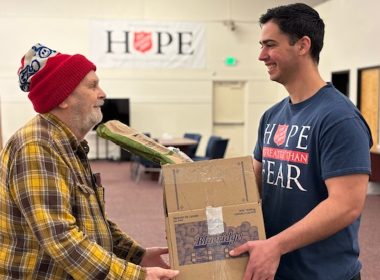Spring 2016 seminar to introduce training material
By Jared McKiernan –
The Salvation Army Western Territory will launch a new initiative next year to help soldiers, cadets and adult rehabilitation center (ARC) personnel more effectively serve those involved with the criminal justice system or anyone simply looking to positively advance their lives.
The initial training session will be held at the College for Officer Training at Crestmont, Calif., from March 22-24, 2016, for anyone interested in implementing the small group training program into their ministry.
The biblically based program called ‘Emerge’ teaches that criminal behavior often occurs in tandem with other stressors in a person’s life. It encourages participants to face the consequences of their behavior, helps them understand the relationship between their behavior and life challenges, and provides tools for making better choices.
The program originally formed in 1992 in the Prairie Division of the Canada & Bermuda Territory. Three years later, the territory partnered with the Canadian justice department to establish it as an official prison diversion alternative.
The training material covers stress management, problem solving, facing addiction, assertiveness, handling loss, self-esteem, goal setting, mental fitness, anger management and conflict management.
“In this way the material is very transferable to other areas of ministry,” said Dianna Bussey, director of The Salvation Army Correctional Justices Services department in Canada and co-author of the material. “We are happy to share what we have learned over the 20-plus years of our involvement with [the program].”
Bussey and Donna Bueckert, social worker and program manager, will conduct the initial training session. Subsequent training sessions will be included in future divisional training events, such as social service councils and officers councils. The content will be tailored to the specific population served by each ministry.
According to Paul Freyder, Southern California divisional social services director, implementing the program in the West makes sense considering the wide-reaching effects of the criminal justice system.
“We have folks involved with the [criminal justice] system probably on our own blocks, if not our own households,” Freyder said. “Prison ministry is so much more than going inside [prisons]. That’s certainly a critical piece, but you can’t stop there.”
Major Tom Ford, secretary of correctional services for the Western Territory, said the move should help bridge the gap between corps, ARC and social services—similar to the territory’s Harvest Initiative.
“We want people to have an opportunity to feel like there’s someone in their corner, someone that’s there for them, to make that connection and make them feel loved,” Ford said. “We’re excited about it.”










